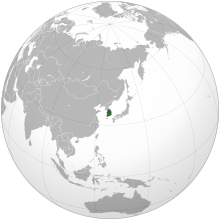
Back معاملة المثليين في كوريا الجنوبية Arabic দক্ষিণ কোরিয়ায় সমকামীদের অধিকার Bengali/Bangla LGBT práva v Jižní Koreji Czech Homosexualität in Südkorea German Diversidad sexual en Corea del Sur Spanish Droits LGBT en Corée du Sud French זכויות להט"ב בקוריאה הדרומית HE दक्षिण कोरिया में एलजीबीटी अधिकार Hindi Hak LGBT di Korea Selatan ID Diritti LGBT in Corea del Sud Italian
LGBT rights in South Korea | |
|---|---|
 | |
| Status | Legal |
| Gender identity | Transgender people allowed to change legal sex |
| Military | Same-sex intercourse is illegal in the military, punishable by up to two years in prison.[1] |
| Discrimination protections | 15 local governments have enacted anti-discrimination policies and provisions that include sexual orientation, though not nationally |
| Family rights | |
| Recognition of relationships | No recognition of same-sex relationships |
| Adoption | No |
Lesbian, gay, bisexual, and transgender (LGBT) people in South Korea face prejudice, discrimination, and other barriers to social inclusion not experienced by their heterosexual counterparts.[2] Same-sex intercourse is legal for civilians in South Korea, but in the military, same-sex intercourse among soldiers is a crime, and all able-bodied men must complete about two years of military service under the conscript system.[3] South Korean national law does not recognize same-sex marriage or civil unions,[4] nor does it protect against discrimination based on sexual orientation or gender identity.[2][5] Same-sex couples cannot jointly adopt,[6] and a 2021 Human Rights Watch investigation found that LGBT students face "bullying and harassment, a lack of confidential mental health support, exclusion from school curricula, and gender identity discrimination" in South Korean schools.[7][8]
On LGBT rights, South Korea is an outlier among other developed democracies, according to an NBC News analysis. On the 2019 Franklin & Marshall Global Barometer of Gay Rights, OECD nations averaged a grade of B. South Korea, however, was one of only three OECD countries to earn an "F," and countries that receive an F are "persecuting" their LGBTQ+ communities, according to the report.[2][5]
Homosexuality remains quite taboo in South Korean society. Homosexuality is not specifically mentioned in either the South Korean Constitution or in the Civil Penal Code, although article 2 of the National Human Rights Commission Of Korea Act includes sexual orientation as one of the protected classes. Transgender or non-binary people are excluded from military service.
Transgender people are allowed to undergo gender affirming care in South Korea after the age of 20, and can change their gender identity on official documents.[9] Harisu is South Korea's first transgender entertainer, and in 2002 became the second person in South Korea to legally change sex.
Gay and lesbian Koreans still face difficulties at home and work, and many prefer not to reveal their sexual orientation to family, friends or co-workers out of fear of discrimination and being ostracized.[10]
A survey by the Pew Research Center in 2023 found that a majority of South Koreans (56%) opposed same-sex marriage, falling behind countries such as Japan (where 74% support same-sex marriage) and Vietnam (where 65% support same-sex marriage).[11]
- ^ Mitsanas, Michael (12 December 2022). "South Korea's LGBTQ community confronts crushing headwinds in fight for equality". NBC News.
- ^ a b c Mitsanas, Michael (12 December 2022). "South Korea's LGBTQ community confronts crushing headwinds in fight for equality". NBC News.
- ^ Amnesty International (11 July 2019). "Serving in silence: LGBTI people in South Korea's military".
- ^ Kim, Min Joo (20 April 2023). "South Korea's gay couples fight for recognition, one law at a time". The Washington Post.
- ^ a b Cite error: The named reference
:7was invoked but never defined (see the help page). - ^ "Same-Sex Couples Excluded from South Korea's New Definition of Families". VOA. 1 February 2021. Retrieved 23 August 2023.
- ^ "'I Thought of Myself as Defective:' Neglecting the Rights of LGBT Youth in South Korean Schools". Human Rights Watch. 14 September 2021.
- ^ "South Korea: LGBT Students Face Bullying, Discrimination". Human Rights Watch. 14 September 2021. Retrieved 23 August 2023.
- ^ "Being gay in South Korea". GayNZ.com. Archived from the original on 7 August 2011. Retrieved 16 September 2010.
- ^ "South Korea's 18th Queer festival starts today, but gay people still face discrimination and hate". Public Radio International.
- ^ Gubbala, Sneha; Miner, William. "Across Asia, views of same-sex marriage vary widely". Pew Research Center. Retrieved 10 March 2024.
© MMXXIII Rich X Search. We shall prevail. All rights reserved. Rich X Search